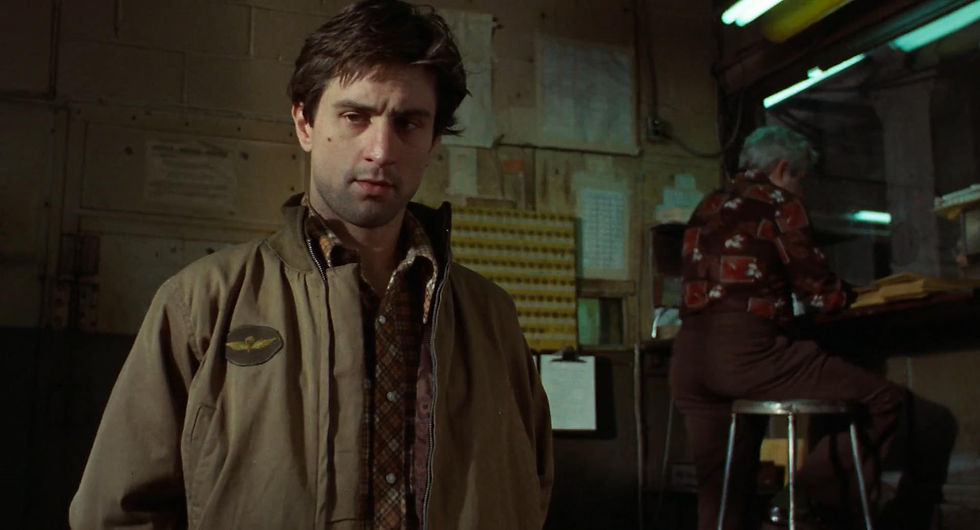Taxi Driver (1976)
- Soames Inscker

- Apr 2, 2025
- 3 min read
Updated: Jun 8, 2025

Taxi Driver, directed by Martin Scorsese and starring Robert De Niro, is one of the most influential and haunting films in cinematic history. Written by Paul Schrader, the film explores themes of loneliness, alienation, urban decay, and violence. With a career-defining performance by De Niro, stunning cinematography by Michael Chapman, and a haunting score by Bernard Herrmann, Taxi Driver remains a masterpiece of psychological drama and neo-noir film making.
Plot Summary
The film follows Travis Bickle (Robert De Niro), a mentally unstable Vietnam War veteran who takes a job as a nighttime taxi driver in New York City. As he navigates the grimy, crime-ridden streets, his isolation and paranoia intensify. He becomes obsessed with cleaning up the city and fixates on two individuals: Betsy (Cybill Shepherd), a political campaign worker whom he unsuccessfully courts, and Iris (Jodie Foster), a 12-year-old prostitute whom he aims to rescue from her pimp, Sport (Harvey Keitel).
As Travis’s sense of purpose warps into violent delusion, he arms himself and prepares for a violent reckoning, culminating in a shocking and brutal climax that cements the film’s reputation as one of the darkest character studies in film history.
Performances and Characters
Robert De Niro as Travis Bickle
De Niro delivers one of the greatest performances in cinema, portraying Travis with a mix of vulnerability, menace, and unpredictability. His descent into madness is both unsettling and deeply compelling. The infamous “You talkin’ to me?” scene is one of the most iconic moments in film history.
Jodie Foster as Iris
Foster, just 12 years old at the time, delivers an astonishingly mature and nuanced performance as Iris, the child prostitute Travis attempts to save. Her portrayal of a lost yet strong-willed girl adds emotional depth to the film.
Cybill Shepherd as Betsy
Shepherd plays Betsy with an air of detached curiosity, initially drawn to Travis but ultimately repulsed by his erratic and inappropriate behaviour. Her rejection serves as one of the catalysts for Travis’s downward spiral.
Harvey Keitel as Sport
Keitel is both charismatic and repulsive as Sport, the manipulative pimp who controls Iris. His brief but intense interactions with Travis add to the film’s tension.
Themes and Symbolism
Loneliness and Alienation
Travis is a deeply isolated character, struggling to connect with the world around him. His taxi serves as both a literal and metaphorical cage, trapping him in a city he despises.
Urban Decay and Moral Corruption
The New York City of Taxi Driver is depicted as a dystopian wasteland filled with crime, filth, and moral degradation. Travis sees himself as a vigilante, determined to purge the city of its corruption.
Violence and Masculinity
Travis’s increasing obsession with violence reflects his internalised frustration and toxic masculinity. His belief that violence is the only way to assert control leads to his inevitable downfall.
The Anti-Hero and Moral Ambiguity
Travis is not a traditional hero—his motivations are warped, and his actions are questionable. However, the film forces the audience to see the world through his eyes, creating a complex moral ambiguity that leaves viewers divided over whether he is a saviour or a menace.
Direction and Cinematography
Scorsese’s direction is masterful, using slow tracking shots, eerie lighting, and an oppressive atmosphere to immerse the audience in Travis’s disturbed mind. Michael Chapman’s cinematography captures New York City’s grime and decay with striking realism, creating an environment that feels as much a character as Travis himself.
Music and Sound Design
Bernard Herrmann’s final score is hauntingly beautiful, blending jazzy saxophones with eerie undertones to reflect Travis’s loneliness and growing madness. The contrast between the film’s dreamlike sound and its harsh visuals enhances its unsettling tone.
Cultural Impact and Legacy
Taxi Driver has left an indelible mark on cinema, influencing countless films and filmmakers. It has been analysed for its psychological depth, its critique of urban decay, and its meditation on violence. The film also gained notoriety due to its connection to John Hinckley Jr., who cited it as an inspiration for his attempted assassination of Ronald Reagan.
Final Verdict
Taxi Driver (1976) is a masterpiece of psychological storytelling, blending gripping performances, stunning direction, and thought-provoking themes. It is a disturbing yet essential exploration of isolation, violence, and the fragile psyche of a man on the edge. More than four decades after its release, it remains one of the most powerful films ever made.






